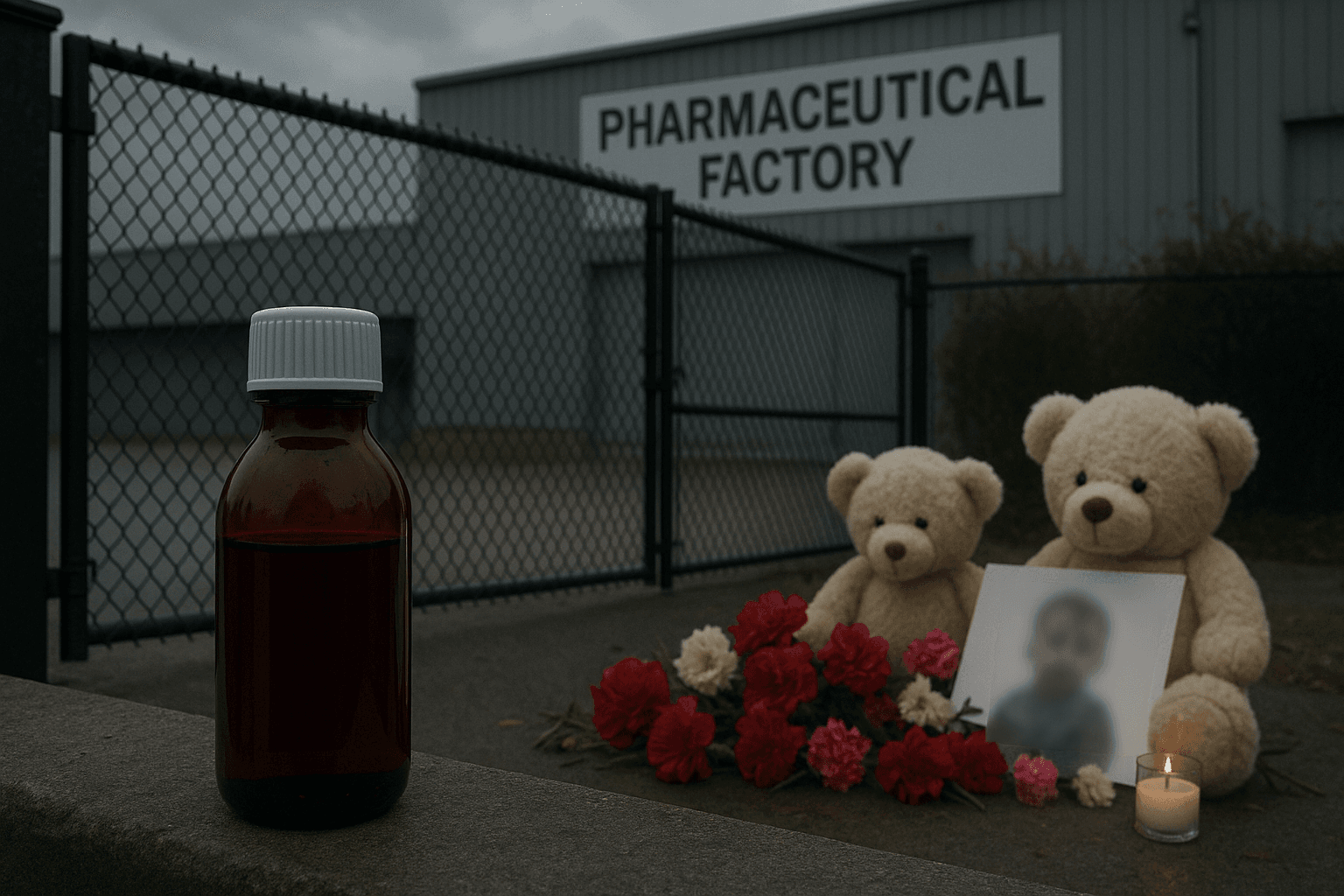- You have no items in your shopping cart
- Subtotal: ₹0.00

The Deadly Mistake: Unraveling the Coldrif Cough Syrup Tragedy and the Man Behind Sresan Pharmaceuticals
In a heartbreaking chapter of India’s ongoing struggle with pharmaceutical safety, the contaminated Coldrif cough syrup has claimed the lives of at least 21 children in Madhya Pradesh, with reports suggesting the toll could rise to 24. This incident, unfolding in the Chhindwara district, has exposed deep flaws in drug manufacturing and regulation, leading to the arrest of the company’s owner and a nationwide scramble to pull tainted products from shelves. At the center of this storm is G Ranganathan, a veteran pharmacist whose decades-long career in the industry now stands overshadowed by allegations of negligence that turned a common remedy into a poison. In this post, we’ll dive into Ranganathan’s background, the history of Sresan Pharmaceuticals, the details of the tragedy, why it proved so fatal for children, and the reasons behind the swift bans.
Who is G Ranganathan? The Pharmacist Turned Pariah
G Ranganathan, aged 73 (though some reports cite 75), is the founder and owner of Sresan Pharmaceuticals, a Chennai-based firm. A graduate of the prestigious Madras Medical College, Ranganathan has built a four-decade career in the pharmaceutical sector, starting as a pharmacist and evolving into a mentor for young entrepreneurs in Tamil Nadu’s drug industry. In the 1980s, he gained early recognition for developing Pronit, a nutritional syrup aimed at pregnant women and children, which quickly became popular among pediatricians in Chennai. Despite facing initial regulatory scrutiny over its ingredients from the state government, Ranganathan navigated the hurdles by obtaining the necessary licenses, showcasing his resilience in a tightly regulated field.
Over the years, Ranganathan expanded his operations, establishing small manufacturing units around Chennai and forging ties with other firms like Ceego Labs and Iven Healthcare. Described by industry peers as active in professional circles, he was known for guiding newcomers in the business. However, details about his personal life, including family, remain scarce in public records, with the focus now squarely on his professional decisions. On October 9, 2025, Madhya Pradesh police, aided by Chennai’s Ashok Nagar team, arrested him at his Kodambakkam residence in a dramatic early-morning raid. He was remanded to 10 days of police custody in Chhindwara, facing charges of culpable homicide not amounting to murder and violations under the Drugs and Cosmetics Act. As the special investigation team (SIT) grills him, questions swirl about lapses in quality control at his factory.
The Rise and Fall of Sresan Pharmaceuticals: A Company History
Sresan Pharmaceuticals, headquartered in Chennai, Tamil Nadu, operates from a modest 2,000-square-foot manufacturing unit along the Chennai-Bengaluru highway in Sunguvarchatram. While the exact founding date isn’t publicly detailed, the company’s roots trace back to Ranganathan’s early ventures in the 1980s with Pronit, the nutritional syrup that marked his entry into pediatric-focused products. Overcoming those initial regulatory “hiccups,” Sresan grew into a producer of liquid formulations, including nasal drops and, more recently, cough syrups like Coldrif.
The company maintained a low profile, supplying products to states like Madhya Pradesh, Odisha, and Puducherry. Its portfolio emphasized affordable remedies for common ailments, with Coldrif—Batch SR-13 manufactured in May 2025 and set to expire in April 2027—marking one of its key offerings for cough and fever relief. Sresan wasn’t a giant in the pharma world but relied on partnerships, such as with Ceego Labs and Iven Healthcare, to distribute its goods. No major scandals marred its record until now, though the 1980s Pronit issues hint at a history of brushing close to compliance edges.
That changed abruptly in late August 2025, when the Sunguvarchatram facility was sealed by authorities. Employees were spotted hastily clearing out Ranganathan’s Kodambakkam office the week prior, moving equipment under cover of night—a sign of impending doom. Today, Sresan stands as a cautionary tale of how small-scale operations can falter under the weight of inadequate oversight.
What Happened in the Incident: A Timeline of Tragedy
The nightmare began in late August 2025 in Chhindwara, a district in Madhya Pradesh’s central region, often lumped into broader “North India” narratives due to its proximity to northern states like Uttar Pradesh. Over a dozen children, aged mostly between 2 and 10, were prescribed Coldrif for mild fevers and coughs—a routine remedy in rural clinics. Within days, they exhibited severe symptoms: vomiting, abdominal pain, and rapid onset of acute kidney failure.
By early October, the death toll climbed to 21 confirmed cases, with health officials reporting up to 24 as investigations deepened. Families like that of 24-year-old Shivani Thakre, whose child succumbed after taking the syrup, have been left devastated. The contaminated batch was traced back to Sresan’s Sunguvarchatram plant, supplied through local distributors to pharmacies in Chhindwara. Tamil Nadu’s drug control lab confirmed the presence of diethylene glycol—a cheap, industrial solvent used as a substitute for the pricier (but safer) propylene glycol in formulations.
Madhya Pradesh Chief Minister Mohan Yadav responded swiftly, forming a seven-member SIT on October 3 to probe the supply chain, manufacturing lapses, and potential criminal negligence. The team raided Sresan’s factory, seizing stocks and testing other batches. The scandal echoed past crises, like the 2022 Uzbekistan syrup deaths, highlighting a pattern of contaminated Indian exports—but this time, the victims were at home.
Why Did the Children Die? The Toxic Truth Behind Diethylene Glycol
Children are particularly vulnerable to medications, and Coldrif’s contamination amplified this risk exponentially. Diethylene glycol (DEG), the culprit chemical, is an antifreeze component that’s lethally toxic when ingested. Labs found “lethal levels” in Batch SR-13, far exceeding safe thresholds. DEG metabolizes into harmful acids that overwhelm the kidneys, causing acute kidney injury (AKI)—a condition where the organs fail to filter waste, leading to seizures, coma, and death.
In Chhindwara, the children—whose smaller bodies process toxins faster—deteriorated within 48-72 hours of consumption. Autopsies revealed renal shutdown as the primary cause, with no other factors like pre-existing conditions implicated in most cases. Experts, including those from the World Health Organization (WHO), have flagged this as no accident but a result of cost-cutting: manufacturers swap DEG for legitimate solvents to slash expenses by up to 90%, evading detection through lax testing. The WHO has since urged India to tighten regulations, calling the incident a stark reminder of gaps in global pharma oversight.
Why Is Coldrif Cough Syrup Banned? A Nationwide Crackdown
The bans came fast and furious. On October 5, 2025, Uttar Pradesh—alerted by the 14 initial deaths in neighboring Madhya Pradesh—imposed a statewide prohibition on Coldrif and all Shreesan/Sresan products. Madhya Pradesh followed suit, not just banning the syrup but revoking Sresan’s entire manufacturing license, effectively shuttering the company. Drug inspectors nationwide are now seizing stocks, tracing distributors, and testing related batches.
The rationale? Public safety overrides all. Under India’s Drugs and Cosmetics Act, contaminated products pose an imminent threat, and the DEG levels violated safety norms set by the Central Drugs Standard Control Organization (CDSCO). This isn’t isolated—similar bans hit other firms in past scandals—but the scale here, with children as primary victims, has amplified calls for stricter import/export checks and on-site audits. Ranganathan’s arrest underscores the human cost: negligence in quality control could lead to life imprisonment.
A Call for Accountability: Lessons from the Coldrif Cough Syrup Crisis
The Coldrif tragedy isn’t just about one man’s missteps or a single company’s failings—it’s a systemic indictment of India’s pharma underbelly, where profit often trumps precaution. G Ranganathan, once a respected figure, now faces the wreckage of his legacy, while grieving families demand justice. As the SIT digs deeper into Sresan’s networks, one hopes this sparks real reform: mandatory DEG screening, harsher penalties, and better rural drug surveillance.
What do you think— is this the wake-up call India needs? Share your thoughts below. Stay vigilant, and always check your meds.
Sources: Reuters, NPR, BBC, NDTV, Indian Express, The Hindu, India Today, and others.
GheeStore produces ghee using the traditional bilona method, which preserves the essential nutrients and provides all the health benefits that pure ghee is known for. With products that are FSSAI certified and lab-tested for purity, GheeStore and Microbasket offers a safer, healthier alternative to mass-produced or adulterated ghee products.
